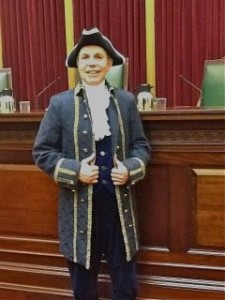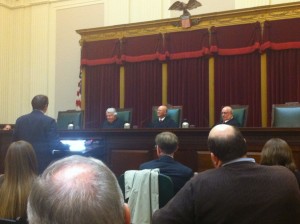Burr on Trial!
On Friday, November 11, Aaron Burr faced a panel of judges again. This time, though, AB (as he signed his letters) was portrayed by the irrepressible Prof. Ronald Collins, while the judges were an eminent group of Washington-based jurists of the 21st century: Chief Judge Andrew Effron of the U.S. Court of Appeals for the Armed Forces, Chief Judge David Sentelle of the U.S. Court of Appeals for the D.C. Circuit, and Chief Judge Royce Lamberth of the U.S. District Court.
Sponsored by the Appellate Judges Education Institute as part of its annual conference, the event was a hoot for those of us who have spent the last two years of our lives studying AB. Indeed, the 200+ lawyers and judges in the audience seemed to enjoy themselves also as prosecutors and defense counsel squared off over two of the key issues posed at the 1807 trial of Burr for treason: (i) the meaning of the treason clause of the Constitution (Article III, Section 3), and (ii) the availability of executive privilege to bar the subpoena of presidential documents.
The prosecutors (John Elwood of Vinson & Elkins and Deanne Maynard of Morrison & Foerster) received a generally warmer treatment from the bench than did defense counsel (Edward Larson of Pepperdine Law School and Jeremy Rosen of Horvitz & Levy), but that’s how it usually goes for defense lawyers. Of course, the defense had the last laugh, as it did in 1807. Burr went free at the end of the trial!
I had the pleasure of opening and closing the hearing by providing historical context.
Enoch Pratt Library/Baltimore
I spoke about American Emperor last Thursday evening at this beautiful facility (in the Poe Room, of course). The podcast is available online!
My interview with Bill Thompson is a bit shorter, and is available from WMAL.com.
Reviews
At MycentralJersey.com, which is affiliated with the Somerville Courier Journal, Charles Paolino writes that “Stewart reveals how tumultuous and unstable the U.S. and its neighbors were in the early 19th century and provides insight into the character of other prominent men of the day — including Jefferson, Hamilton and Marshall.”
He concludes that American Emperor is a “lively . . . and an entertaining opportunity to experience a chapter in American history from the viewpoint of one its most bizarre players.”
The Associated Press review of American Emperor (which found it “gripping,” not to mention “fascinating, surprising, and a good read”) has landed in newspapers in San Francisco, North Carolina, Indiana, and at a Louisiana TV station.

